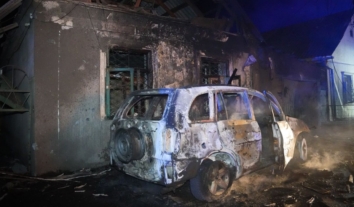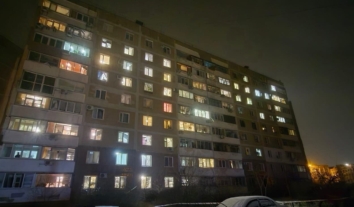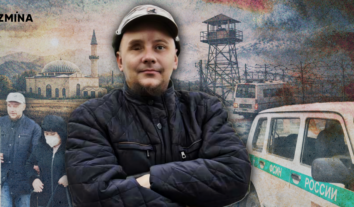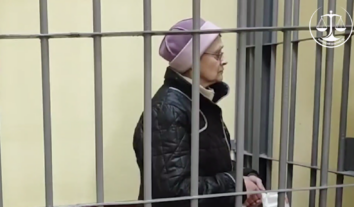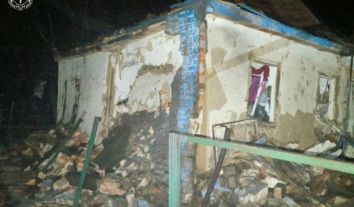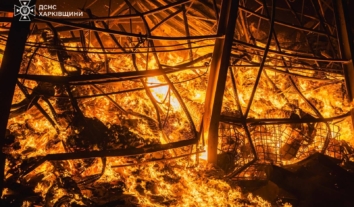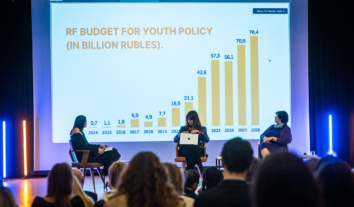Ukrainian investigators and judges continue to ignore international humanitarian law when considering collaborationist cases
Ukrainian courts continue to adopt a formalistic approach when adjudicating collaboration cases, frequently disregarding international humanitarian law and the grim realities of life under occupation, ZMINA human rights advocates warn. They point out breaches of legal certainty, the presumption of direct intent without adequate evidence, and a general failure to consider the context of occupation. These conclusions stem from an analytical report titled “Liability for collaborationism: how has judicial practice changed?”, in which ZMINA human rights advocates analysed verdicts listed in the Unified State Register of Court Decisions.
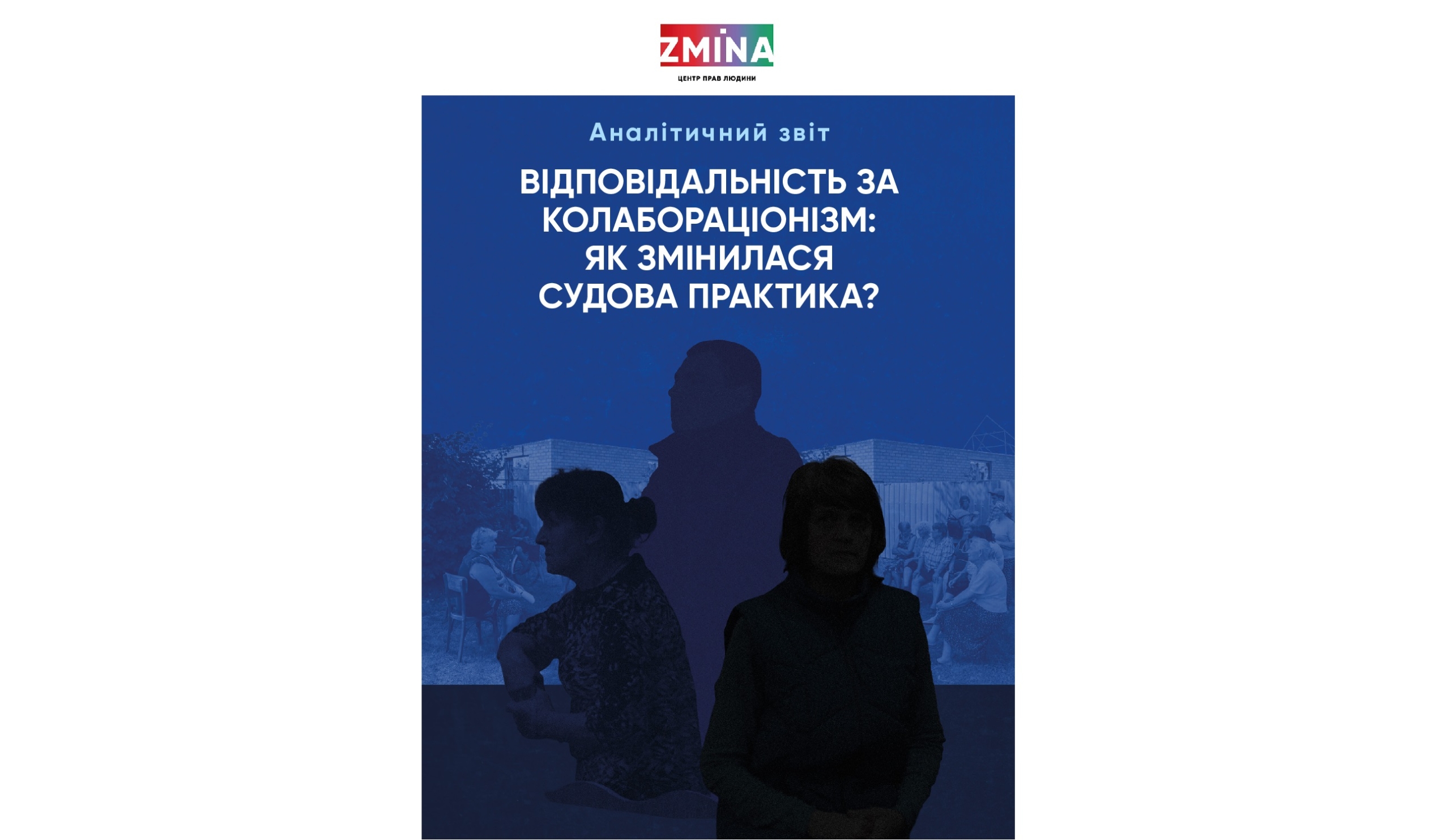
Human rights organisations note that in the three years since Article 111-1 (“collaborative activity”) was introduced into Ukraine’s Criminal Code, substantial judicial practice has accumulated in this category of cases. As of December 31, 2024, the Unified State Register of Court Decisions contained 1,956 verdicts.
While the largest number of verdicts—517—still pertain to Part 1 of Article 111-1 of the Criminal Code of Ukraine (public denial of armed aggression and public calls for supporting the aggressor state’s decisions and actions), the period between June 15 and December 31, 2024, saw a decrease in verdicts under this part, alongside an increase in verdicts under other parts of the article for crimes such as:
- Propaganda in educational institutions and the implementation of the aggressor state’s educational standards (Part 3 of Article 111-1 of the Criminal Code of Ukraine);
- Transfer of material resources and economic activity in cooperation with the aggressor state (Part 4 of Article 111-1 of the Criminal Code of Ukraine);
- Voluntary assumption of positions in illegal authorities involving organisational, administrative, or economic functions (Part 5 of Article 111-1 of the Criminal Code of Ukraine);
- Organisation and conduct of political events, and information activities in cooperation with the aggressor state (Part 6 of Article 111-1 of the Criminal Code of Ukraine);
- Voluntary assumption of positions by a Ukrainian citizen in illegal judicial or law enforcement agencies, as well as voluntary participation in illegal armed or paramilitary formations (Part 7 of Article 111-1 of the Criminal Code of Ukraine).
Out of the total number of verdicts, courts issued only four acquittals, three of which were overturned by higher courts and sent for retrial. An appeal in another criminal case remains under consideration.
Read also: The Prosecutor General’s Office encourages journalists to cover collaboration cases. Some of them highlight legislative flaws (in Ukrainian)
Human rights advocates observe a growing trend of collaboration cases being heard in absentia (without the accused’s presence) for all parts of the article except the first and second. As the number of verdicts issued in absentia increases, so does the decreased possibility of plea bargains, as cases are heard in the accused’s absence.
Throughout 2024, no plea agreements were reached in proceedings under Parts 2, 6, and 7. However, in proceedings under Part 4, plea agreements remain highly relevant, with their number tripling in 2024 compared to 2023.
ZMINA Human rights advocates also note the development of appellate judicial practice in Ukraine, with an increase in the number of appeals, particularly concerning verdicts issued under Part 5 of Article 111-1 of the Criminal Code of Ukraine. However, a negligible number of appellate proceedings have yielded positive outcomes for the defence.
In addition to the growing number of decisions at the appellate level, the Supreme Court’s practice continues to solidify problematic trends established at the first and second instances. Throughout 2024, only 14 cassation proceedings were opened based on cassation appeals from the defence.
Human rights organisations emphasise that Ukrainian courts fail to consider international rules of conduct during wartime when examining collaboration cases.
Read also: Ukrainians working in occupied territories: What does international humanitarian law say? (in Ukrainian)
They underscore that the legislation contains no exceptions for activities permitted under international humanitarian law. Consequently, law enforcement practices indicate that individuals performing functions that could be interpreted as ensuring essential services under occupation are being prosecuted. This includes medical professionals, clergy, civil defence organisation employees involved in evacuation, rescue work, firefighting, urgent restoration of critical utilities, and assistance in preserving objects necessary for the population’s survival.
Human rights advocates from the Human Rights Centre ZMINA point out that the continued violation of the principle of legal certainty in the article’s wording leads to a broad and formalistic approach to qualifying actions as collaborative activity.
Read also: Prosecutor withdraws cassation against Lyman electrician jailed for remaining in occupation and restoring power grids (in Ukrainian)
Specifically, an approach has been established and cemented in which liability arises from the mere fact of holding a position in an occupying authority rather than from the individual’s specific activities during their work. This formalistic approach to interpreting “holding a position in illegitimate authorities” and “holding a position in a law enforcement agency” creates several problems in qualifying offences.
The human rights organisation points out specific cases where a Ukrainian citizen was formally appointed by Russian occupiers to a position involving organisational or administrative-economic functions, yet did not perform these, instead engaging in entirely different activities. Nevertheless, law enforcement officials still classify their actions as holding a position, leading to a more severe punishment.
ZMINA human rights advocates explain that this broad and formalistic approach results in inconsistent interpretation and application of legislation. They found that in one criminal proceeding, the holding of almost identical positions was qualified under Part 5, focusing on the organizational and administrative functions of the position, while in another, it was qualified under Part 7 of Article 111-1, as the position in both cases was characterized as “a position in a law enforcement agency”.
Furthermore, because investigators do not examine the specific functions performed by an individual in a position, when classifying them as collaborative activity, the insignificance of the act—meaning that the act does not pose a public danger, having caused or being unable to cause significant harm to an individual, legal entity, society, or the state—is not considered.
Another persistent trend in judicial practice is the presumption of direct intent in cases concerning alleged collaborative activity. Ukrainian courts automatically assume that individuals consciously and intentionally cooperated with the Russian occupiers, without properly verifying this. The burden of proof to the contrary largely falls on the defence.
Human rights advocates indicate that “direct intent” is mentioned in the reviewed proceedings mostly formally, without any additional examination of this characteristic.
The Human Rights Centre ZMINA cites the case of “street committee leaders”, which was heard by judges of all three instances and upheld the first instance’s guilty verdict, as a telling example of several problematic trends in judicial practice.
Read also: Appellate court upholds 5-year prison sentence for Lyman street committee head Tetiana Potapenko under collaboration article (in Ukrainian)
The courts did not address the justification for qualifying the work of a “street committee leader” as holding a position in the occupation administration, considering that this is a body of self-organisation of the local population that existed before the temporary occupation, the absence of a job description, or any remuneration. Furthermore, the courts did not define “organisational and administrative functions.”
During the proceedings, it was also emphasised that “the purpose and motive” of the actions were irrelevant, and the context and conditions of occupation in which the accused and other residents of the occupied city found themselves were not considered at all.
Human rights advocates state that judicial practice continues to affirm a narrow interpretation of coercion and voluntariness when assessing the elements of a crime. Courts fail to consider that people in occupied territories are under constant pressure and fear due to the presence of Russian occupiers. Instead, they often assume that individuals voluntarily cooperated with the occupiers, without taking into account the actual circumstances of life under occupation.
“Also, the court does not assess the facts of mass and systematic violations of international humanitarian law by representatives of the Russian Federation, including illegal detentions, enforced disappearances, ill-treatment, and torture, etc., against the civilian population in the temporarily occupied territories of Ukraine. Current trends in judicial practice, from the first instance to the Supreme Court’s review of proceedings regarding alleged collaborative activity, contribute to and reinforce the stereotype that merely remaining and surviving in the temporarily occupied territories of Ukraine is in itself an offence,” the authors of the study conclude.
Earlier, Inna Vyshnevska, a research fellow at the Lviv State University of Internal Affairs’ research laboratory, explained the legislator’s readiness to address shortcomings in collaboration legislation and discussed proposed bills in this area.
Olha Skrypnyk, Head of the Crimean Human Rights Group and coordinator of the International Crimea Platform Expert Network, expressed during Coalition Talks her conviction that collaboration cases pose a challenge to the state.
The human rights advocate stated that there are currently known examples of criminal cases that threaten the successful reintegration of liberated territories. She believes that the proper regularisation of collaboration legislation will determine how quickly Ukraine can restore vital activities in these territories.
Previously, Tetiana Pechonchyk, Head of the Human Rights Centre ZMINA, stated during the presentation of a shadow report to the European Commission that, unlike other EU candidate countries, the Ukrainian state must provide answers and develop approaches to several challenges during the de-occupation and reintegration of liberated territories.


